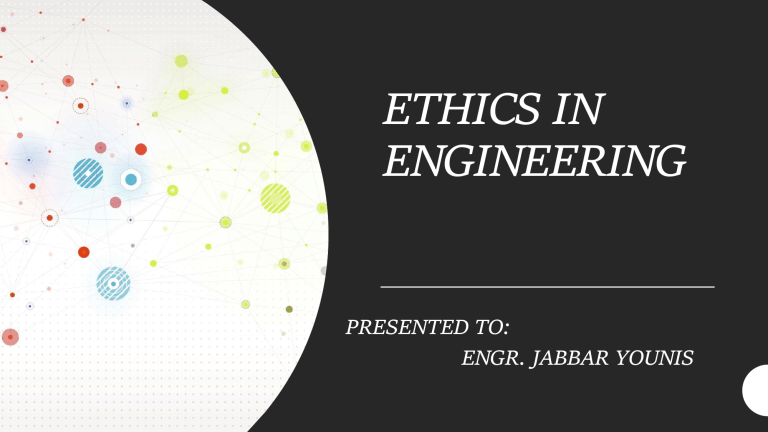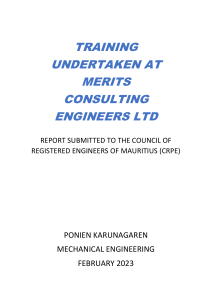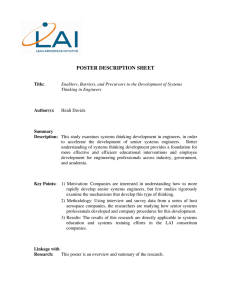
ETHICS IN ENGINEERING PRESENTED TO: ENGR. JABBAR YOUNIS ETHICS IN ENGINEERING Ethics in engineering refers to the set of principles, values, and standards that guide the behavior and decisionmaking of engineers in their professional practice. These ethics help ensure that engineers uphold the highest standards of integrity, competence, and accountability while serving the needs of society. IMPOROTANCE Protects public safety and welfare from potential harm caused by engineering decisions. Builds trust and credibility with clients, colleagues, and the public. Maintains professional reputation and avoids legal consequences. CONFIDENTIALITY Definition: Protecting sensitive information entrusted to an engineer by clients or employers. Types of confidential information: Trade secrets Client data Internal documents Protects intellectual property and competitive advantage. Builds trust with clients and maintains competitive edge. Ensures fair competition and protects sensitive information. IMPOROTANCE Honesty Definition: Being truthful and transparent in all professional interactions. Transparency and truthfulness are essential in engineering. Engineers should provide accurate information and not misrepresent data or findings. Honesty Importance: Building credibility, trust, and maintaining professional integrity. Example: Providing honest estimates of project timelines and openly communicating potential challenges Conflict of Interest Definition: Navigating situations where personal interests may influence professional decisions. Always tell if there might be a conflict of interest. This makes things clear and keeps trust strong. Conflict of Interest Importance: Maintaining objectivity, ensuring fair practices, and avoiding bias. Engineers must avoid situations where personal interests may compromise their professional judgment or integrity. Example: Disclosing personal relationships that might affect decision-making, such as familial or financial ties. Integrity Definition: Ensuring the accuracy, consistency, and reliability of engineering data. Engineers must ensure the accuracy and reliability of the data they use in their work. This includes verifying the sources of data and conducting thorough quality checks. This includes maintaining transparency and ethical standards in data analysis and reporting. Integrity Importance: Upholding the quality and trustworthiness of engineering work. Example: Regularly validating and crosschecking data in research or design processes. Environmental Health Definition: Considering the impact of engineering activities on the environment. Engineers must prioritize sustainability in their projects to minimize the negative impact on the environment. Promoting the use of renewable energy sources such as wind and solar power. Environmental Health Importance: Promoting sustainable practices, minimizing negative effects, and meeting regulatory standards. Example: Implementing eco-friendly designs to reduce carbon footprint and environmental impact. Conclusion Ethics are a vital aspect of engineering. It is crucial for engineers to uphold principles of confidentiality, honesty, data integrity, environmental health, and avoid conflicts of interest to maintain professional ethics. By adhering to these ethical standards, engineers can ensure the safety, wellbeing, and trust of the public they serve. Thank You For Attention Muhammad Faizan: Muhammad Abis: Ameer Hamza: FA21-BEE-064 FA21-BEE-089 FA21-BEE-068
![Question 1 [ ] 1- What is the main goal for software engineering](http://s2.studylib.net/store/data/010210498_1-4a6ecbb9be365dadeadd769b25d4af75-300x300.png)


